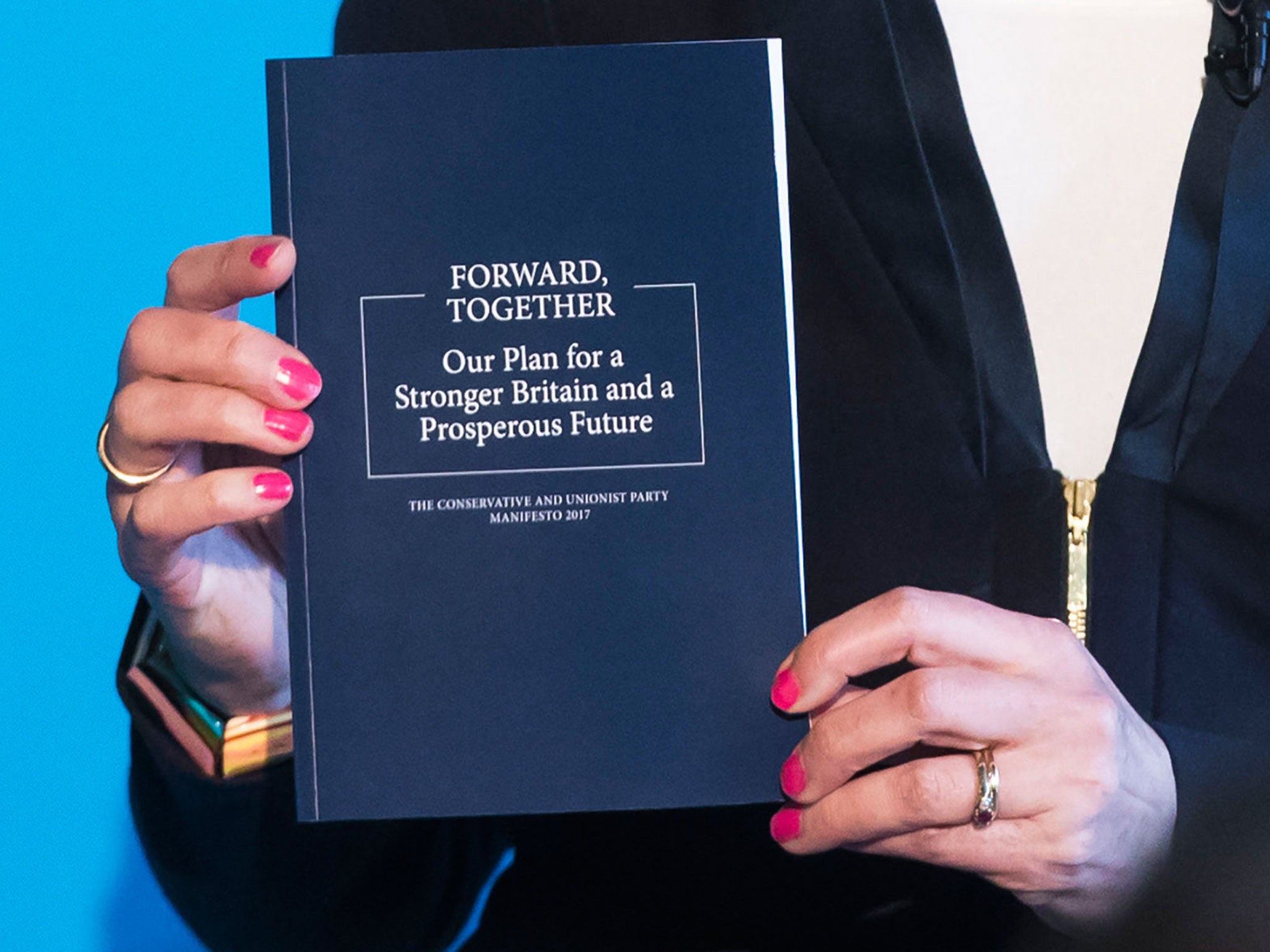Tory manifesto: What policies will change after Theresa May's humiliating election result?
With her authority in tatters following last weeks calamitous election result, May will be forced to substantially water down some of the policies in the Conservative manifesto, or drop them entirely

Your support helps us to tell the story
From reproductive rights to climate change to Big Tech, The Independent is on the ground when the story is developing. Whether it's investigating the financials of Elon Musk's pro-Trump PAC or producing our latest documentary, 'The A Word', which shines a light on the American women fighting for reproductive rights, we know how important it is to parse out the facts from the messaging.
At such a critical moment in US history, we need reporters on the ground. Your donation allows us to keep sending journalists to speak to both sides of the story.
The Independent is trusted by Americans across the entire political spectrum. And unlike many other quality news outlets, we choose not to lock Americans out of our reporting and analysis with paywalls. We believe quality journalism should be available to everyone, paid for by those who can afford it.
Your support makes all the difference.At the looming Queen’s Speech, Theresa May will outline her minority government’s plans for new laws. It should have been an opportunity for the Prime Minister to implement the main contents of the Conservative’s general election manifesto.
But with her authority in tatters following last weeks calamitous election result, Ms May will be forced to substantially water down some of the policies in the Conservative manifesto, or drop them entirely.
David Davis, the Brexit Secretary, said on Monday that some sections of the manifesto will have to be “pruned away” due to the weak position of the Government.
Ms May will also have to make some concessions in order to form an agreement with the DUP to ensure the Queen’s speech actually passes a Commons vote. Here The Independent looks at some of Ms May’s pledges that are likely to be abandoned.
Fox hunting
Any attempt to try and change the laws on fox hunting in the aftermath of the general election have been described as “absolute insanity” by the former Conservative party chairman Grant Shapps. On the campaign trail Ms May admitted she had always been in favour of fox hunting – opposed by the majority of the public according to recent polls – and said she would grant a free vote on the contentious issue.
“It’s absolute insanity to start talking about passing and changing fox hunting laws, what an Earth was that about?” Mr Shapps added. “I thought a mistake had been made, perhaps an off-the-cuff comment. This now stands absolutely no chance. It’s a silly idea.”
It’s fair to say plans for a vote on fox hunting will now be kicked into the long grass.
Brexit
Ms May will undoubtedly have to soften her stance on Brexit if she is to pass crucial votes in the Commons over the coming months and years. The Brexit Secretary also admitted on Monday he was open to co-operation with Labour but rejected the possibility of retaining membership of the single market.
Senior Tories including Philip Hammond, the Chancellor, and Ruth Davidson, the Scottish Conservative leader, have both stressed the need to put the economy at the forefront of the negotiations, which has been taken to suggest disagreements with the focus on curbing immigration.
It is likely the PM could also be held to ransom by pro-EU Tory MPs who have been vocal in their opposition to Ms May’s approach to Brexit, including the former ministers Nicky Morgan, Anna Soubry and Kenneth Clarke. Expect key concessions to be made to Conservative MPs ahead of any votes.
Grammar schools
Ms May’s mission to turn Britain into a the “ world’s greatest meritocracy” by increasing the number of grammar schools for the first time in decades is now likely to be shelved. Graham Brady, who chairs the Conservatives’ influential 1922 Committee of backbenchers, said at the weekend his party could be forced to settle for introducing a “rather modest pilot” in place of its manifesto commitment.
Nick Timothy, one of the Prime Minister’s former chiefs of staff, was also one of the main architects of the grammar schools programme. But he was forced to resign after the election amid strong criticism of his role in the campaign.
Free-school meals
The Conservative manifesto also proposed cutting free school meals for thousands of children in Britain – a policy introduced during the coalition years. Ms May had intended to replace them with free school breakfasts. But lacking any parliamentary authority and considerable opposition to the plans, it is another policy that could be dropped in its entirety.
Social care (“dementia tax”)
Mr Timothy also came under intense criticism for the social care reforms proposed by Ms May in her programme for government. Announcing his resignation, he said he regretted the “decision not to include in the manifesto a ceiling as wells as a floor in our proposals to help meet the increasing cost of social care”.
It is likely the plans for social care – dubbed a “dementia tax” by critics – will be substantially watered down or dropped all together.
Triple-lock and means testing winter fuel payments
It is unlikely the Democratic Unionist Party (DUP), who Ms May’s administration are currently negotiating with to form a “supply and confidence” set up for the new government, will support these contentious reforms. According to one report in the Sunday Post, DUP source said they will not support any changes to the triple lock, forcing Ms May to drop the plan.
“There will be no formal coalition and we have other priorities – not least Brexit – for the negotiations, but we won’t support any changes to the pensions triple lock,” the source told the newspaper.
Join our commenting forum
Join thought-provoking conversations, follow other Independent readers and see their replies
Comments